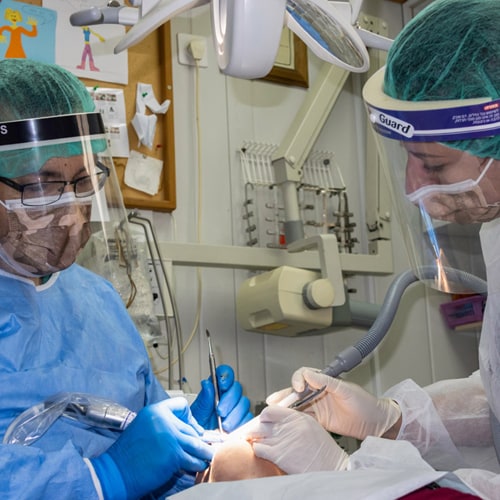When I said goodbye to my coworkers on March 16, 2020, I truly did not comprehend how much time would pass before we reopened the office. As the weeks went by I began to wonder when we would be able to reopen and what the new normal of clinical practice would look like.
In New Jersey we were given a directive from our Governor that beginning May 27, 2020 we could resume non-emergent care. Our office began to plan for reopening, and the hygiene department resumed at the beginning of June.
Deciding to Return to Work
I know many dental hygienists who had reservations about returning to work. My husband even suggested I consider staying home with our children through the summer.
But, I was ready to return to the office, I felt safe and my commitment to patient care was drawing me back. I was also thankful for an employer who worked hard to secure appropriate PPE and placed upmost importance on following the CDC interim guidance.
The New Normal
As dental professionals we are used to wearing personal protective equipment (PPE). We are not used to greeting our patients while wearing our PPE.
Wearing a mask while communicating with our patients is not new. However, we are not used to wearing an N95, or a level 3 mask with a level 2 on top of it, a face shield and a head covering the entire time we are in the office. Many of us have found it difficult to take a break and stay hydrated because of this new routine.
Our protocols have always included reviewing and updating medical histories. Now, due to COVID-19, there are additional screening steps and paperwork to complete. These additional steps are adding time to our patient appointments.
The CDC has recommended avoiding and reducing the production of aerosols whenever possible. Including, the recommendation to not use the ultrasonic scaler, and avoiding the use of handpieces and the air/water syringe. For many of us this is a challenge because we rely on our ultrasonic scaler as part of providing optimal oral healthcare.
Learning to Adapt to Change
All of these changes in clinical practice can be challenging. However it can also be rewarding, and an opportunity for professional growth, to identify what part of the new routine is most challenging for you and find healthy ways to adapt.
Time management is always a priority for dental hygienists. We know that most patients will arrive right at their scheduled appointment time. Communication between the dental team and patients is key to preventing the additional screenings from cutting into appointment times. If patients know that you need them to arrive 10 minutes prior to their scheduled appointment time to fill out COVID-19 screenings forms, most will oblige.
It is important that you take a break, take time to remove your PPE, hydrate and grab a healthy snack. With our new normal this can be hard to do. I personally have struggled asking for help because I don't want to "bother" anyone. I am learning to let another team member know when I need to take a break. Asking for help to turn over your room, seat your patient or take X-rays can provide the few extra minutes you need to ensure you are minding your own health.
Since the use of the ultrasonic scaler is not recommended, it is important to have sharp hand instruments. If the instruments you have are not in good condition ask your employer to purchase new ones. Also be sure to take the time to sharpen instruments on a regular basis.
The CDC states that if aerosol-generating procedures are necessary for dental care, to use high volume evacuation (HVE). There are a lot of different HVE attachments available to assist dental hygienists. If you are unsure of which option is best for you, ask for information by contacting your dental distributor and they will be able to help guide you.
Conclusion
Our new normal may only be temporary during the COVID-19 pandemic, but as a profession we will always continue to make necessary changes that allow us to stay in line with our core values. As the American Dental Hygiene Association Code of Ethics states, "We accept our fundamental obligation to provide services in a manner that protects all clients and minimizes harm to them, and others involved in their treatment."


Was this article helpful?
If you’d like a response, Contact Us.